Entrepreneurship and Small Business Management: A FSB Report
VerifiedAdded on 2023/01/09
|17
|5004
|53
Report
AI Summary
This report provides an overview of entrepreneurship and small business management, focusing on different types of entrepreneurial ventures and their relationship to the typology of entrepreneurship. It examines the similarities and differences between public, private, and social ventures, considering their roles, characteristics, and objectives. The report also assesses the impact of micro and small businesses on the UK's economic and social-economic development, highlighting their contribution to job creation and overall turnover. Furthermore, it discusses the characteristics, traits, and skills of successful entrepreneurs, as well as aspects of the entrepreneurial personality. The report concludes by examining how background and experience can either hinder or foster entrepreneurship, providing a comprehensive analysis of the entrepreneurial landscape in the UK. Desklib is a great platform to find similar solved assignments.

ENTREPRENEURSHIP
AND SMALL BUSINESS
MANAGEMENT
AND SMALL BUSINESS
MANAGEMENT
Paraphrase This Document
Need a fresh take? Get an instant paraphrase of this document with our AI Paraphraser
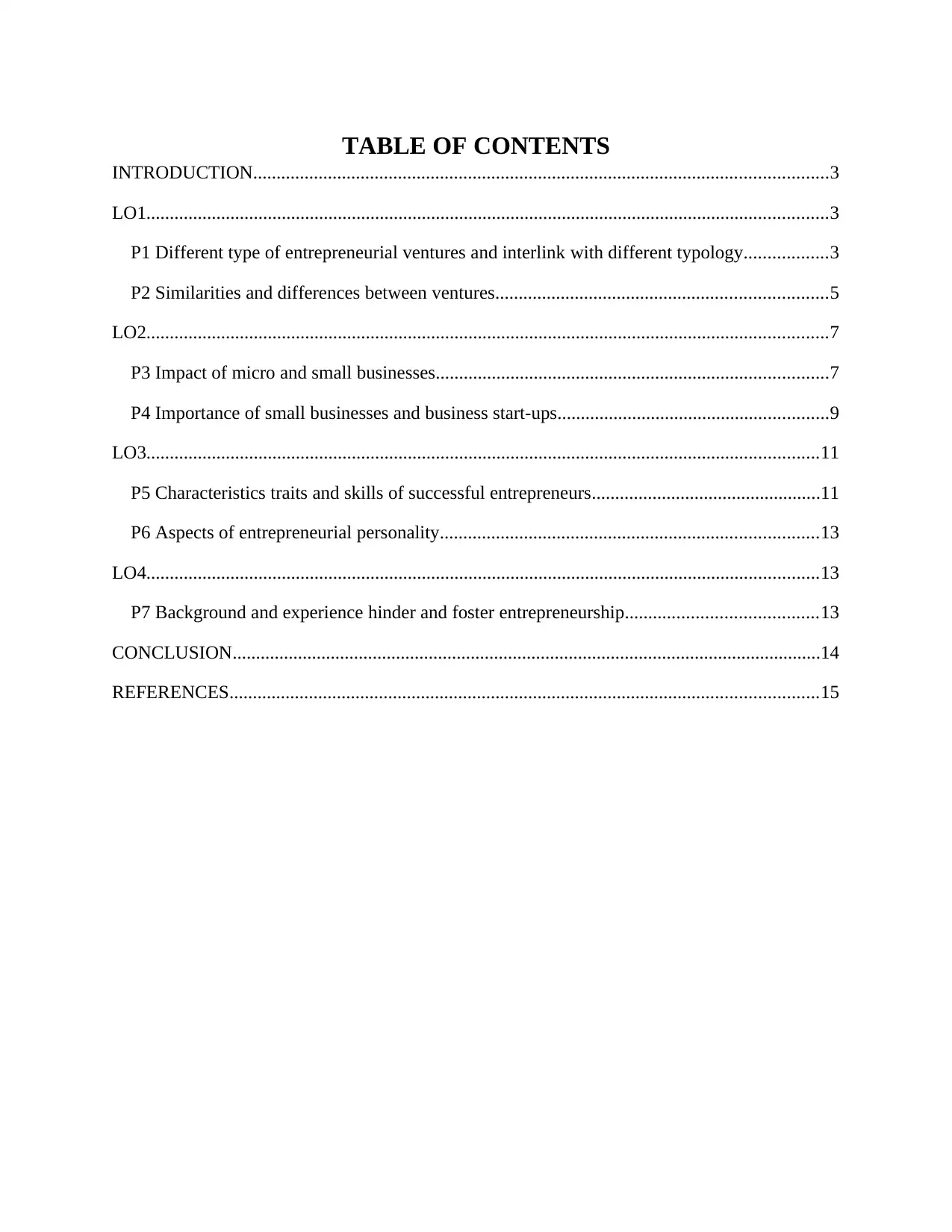
TABLE OF CONTENTS
INTRODUCTION...........................................................................................................................3
LO1..................................................................................................................................................3
P1 Different type of entrepreneurial ventures and interlink with different typology..................3
P2 Similarities and differences between ventures.......................................................................5
LO2..................................................................................................................................................7
P3 Impact of micro and small businesses....................................................................................7
P4 Importance of small businesses and business start-ups..........................................................9
LO3................................................................................................................................................11
P5 Characteristics traits and skills of successful entrepreneurs.................................................11
P6 Aspects of entrepreneurial personality.................................................................................13
LO4................................................................................................................................................13
P7 Background and experience hinder and foster entrepreneurship.........................................13
CONCLUSION..............................................................................................................................14
REFERENCES..............................................................................................................................15
INTRODUCTION...........................................................................................................................3
LO1..................................................................................................................................................3
P1 Different type of entrepreneurial ventures and interlink with different typology..................3
P2 Similarities and differences between ventures.......................................................................5
LO2..................................................................................................................................................7
P3 Impact of micro and small businesses....................................................................................7
P4 Importance of small businesses and business start-ups..........................................................9
LO3................................................................................................................................................11
P5 Characteristics traits and skills of successful entrepreneurs.................................................11
P6 Aspects of entrepreneurial personality.................................................................................13
LO4................................................................................................................................................13
P7 Background and experience hinder and foster entrepreneurship.........................................13
CONCLUSION..............................................................................................................................14
REFERENCES..............................................................................................................................15
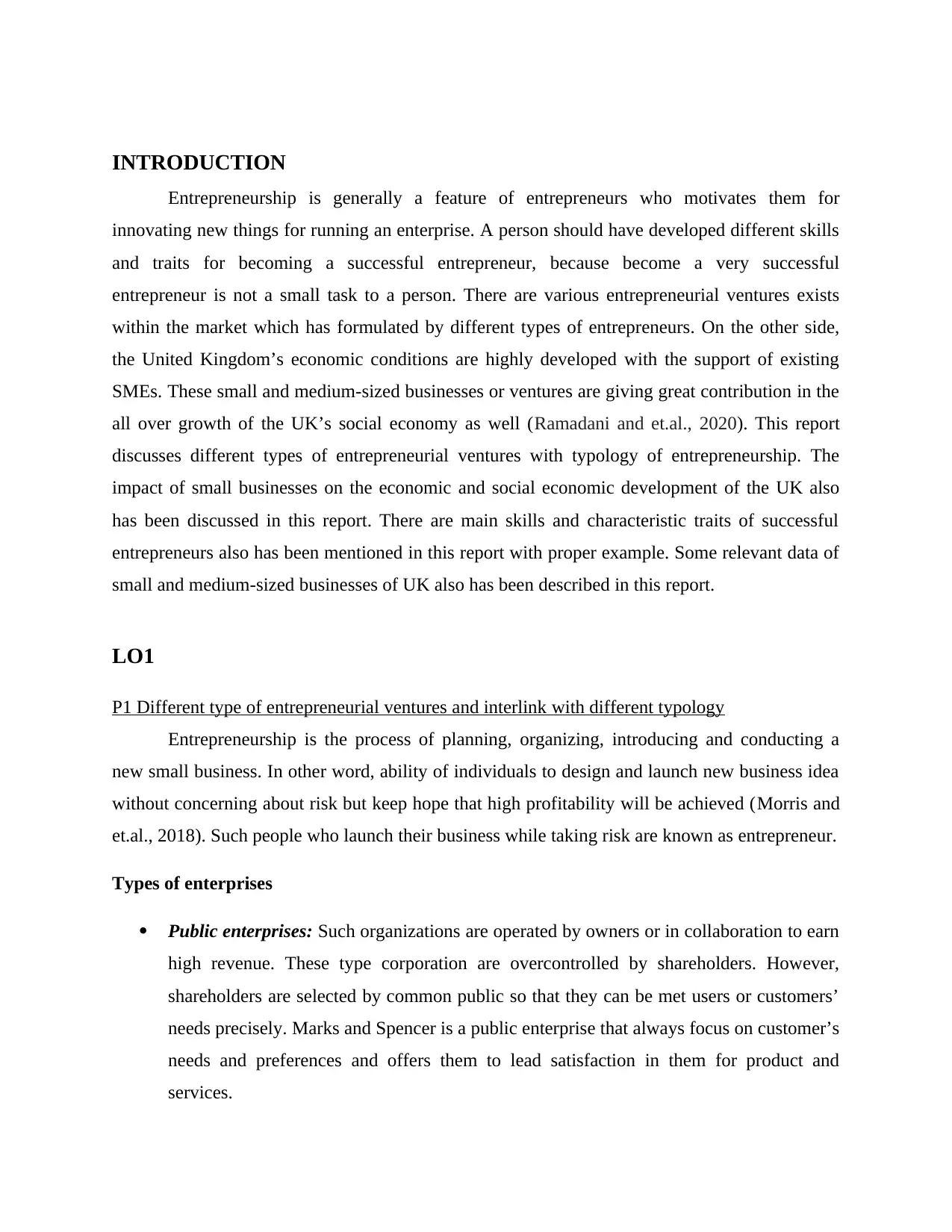
INTRODUCTION
Entrepreneurship is generally a feature of entrepreneurs who motivates them for
innovating new things for running an enterprise. A person should have developed different skills
and traits for becoming a successful entrepreneur, because become a very successful
entrepreneur is not a small task to a person. There are various entrepreneurial ventures exists
within the market which has formulated by different types of entrepreneurs. On the other side,
the United Kingdom’s economic conditions are highly developed with the support of existing
SMEs. These small and medium-sized businesses or ventures are giving great contribution in the
all over growth of the UK’s social economy as well (Ramadani and et.al., 2020). This report
discusses different types of entrepreneurial ventures with typology of entrepreneurship. The
impact of small businesses on the economic and social economic development of the UK also
has been discussed in this report. There are main skills and characteristic traits of successful
entrepreneurs also has been mentioned in this report with proper example. Some relevant data of
small and medium-sized businesses of UK also has been described in this report.
LO1
P1 Different type of entrepreneurial ventures and interlink with different typology
Entrepreneurship is the process of planning, organizing, introducing and conducting a
new small business. In other word, ability of individuals to design and launch new business idea
without concerning about risk but keep hope that high profitability will be achieved (Morris and
et.al., 2018). Such people who launch their business while taking risk are known as entrepreneur.
Types of enterprises
Public enterprises: Such organizations are operated by owners or in collaboration to earn
high revenue. These type corporation are overcontrolled by shareholders. However,
shareholders are selected by common public so that they can be met users or customers’
needs precisely. Marks and Spencer is a public enterprise that always focus on customer’s
needs and preferences and offers them to lead satisfaction in them for product and
services.
Entrepreneurship is generally a feature of entrepreneurs who motivates them for
innovating new things for running an enterprise. A person should have developed different skills
and traits for becoming a successful entrepreneur, because become a very successful
entrepreneur is not a small task to a person. There are various entrepreneurial ventures exists
within the market which has formulated by different types of entrepreneurs. On the other side,
the United Kingdom’s economic conditions are highly developed with the support of existing
SMEs. These small and medium-sized businesses or ventures are giving great contribution in the
all over growth of the UK’s social economy as well (Ramadani and et.al., 2020). This report
discusses different types of entrepreneurial ventures with typology of entrepreneurship. The
impact of small businesses on the economic and social economic development of the UK also
has been discussed in this report. There are main skills and characteristic traits of successful
entrepreneurs also has been mentioned in this report with proper example. Some relevant data of
small and medium-sized businesses of UK also has been described in this report.
LO1
P1 Different type of entrepreneurial ventures and interlink with different typology
Entrepreneurship is the process of planning, organizing, introducing and conducting a
new small business. In other word, ability of individuals to design and launch new business idea
without concerning about risk but keep hope that high profitability will be achieved (Morris and
et.al., 2018). Such people who launch their business while taking risk are known as entrepreneur.
Types of enterprises
Public enterprises: Such organizations are operated by owners or in collaboration to earn
high revenue. These type corporation are overcontrolled by shareholders. However,
shareholders are selected by common public so that they can be met users or customers’
needs precisely. Marks and Spencer is a public enterprise that always focus on customer’s
needs and preferences and offers them to lead satisfaction in them for product and
services.
⊘ This is a preview!⊘
Do you want full access?
Subscribe today to unlock all pages.

Trusted by 1+ million students worldwide
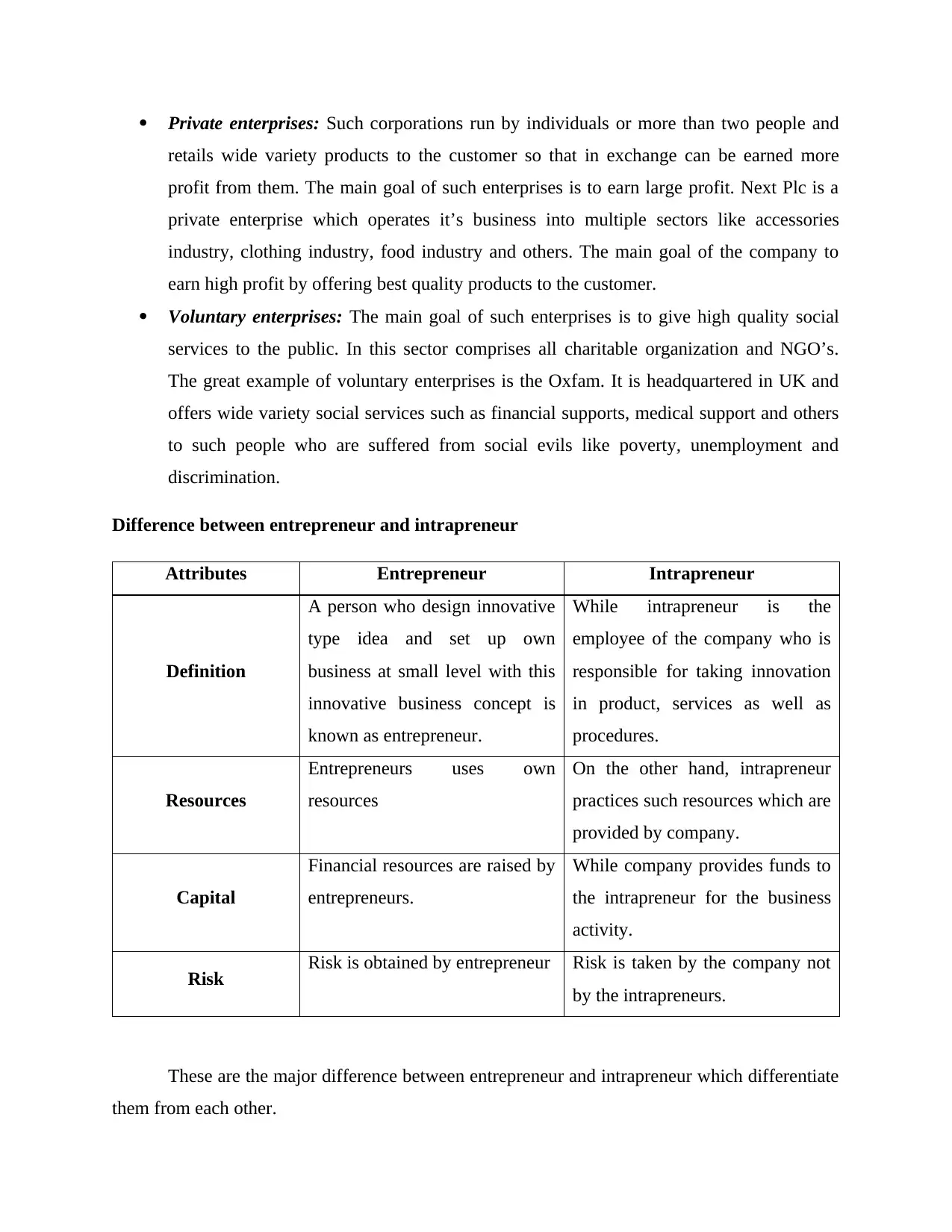
Private enterprises: Such corporations run by individuals or more than two people and
retails wide variety products to the customer so that in exchange can be earned more
profit from them. The main goal of such enterprises is to earn large profit. Next Plc is a
private enterprise which operates it’s business into multiple sectors like accessories
industry, clothing industry, food industry and others. The main goal of the company to
earn high profit by offering best quality products to the customer.
Voluntary enterprises: The main goal of such enterprises is to give high quality social
services to the public. In this sector comprises all charitable organization and NGO’s.
The great example of voluntary enterprises is the Oxfam. It is headquartered in UK and
offers wide variety social services such as financial supports, medical support and others
to such people who are suffered from social evils like poverty, unemployment and
discrimination.
Difference between entrepreneur and intrapreneur
Attributes Entrepreneur Intrapreneur
Definition
A person who design innovative
type idea and set up own
business at small level with this
innovative business concept is
known as entrepreneur.
While intrapreneur is the
employee of the company who is
responsible for taking innovation
in product, services as well as
procedures.
Resources
Entrepreneurs uses own
resources
On the other hand, intrapreneur
practices such resources which are
provided by company.
Capital
Financial resources are raised by
entrepreneurs.
While company provides funds to
the intrapreneur for the business
activity.
Risk Risk is obtained by entrepreneur Risk is taken by the company not
by the intrapreneurs.
These are the major difference between entrepreneur and intrapreneur which differentiate
them from each other.
retails wide variety products to the customer so that in exchange can be earned more
profit from them. The main goal of such enterprises is to earn large profit. Next Plc is a
private enterprise which operates it’s business into multiple sectors like accessories
industry, clothing industry, food industry and others. The main goal of the company to
earn high profit by offering best quality products to the customer.
Voluntary enterprises: The main goal of such enterprises is to give high quality social
services to the public. In this sector comprises all charitable organization and NGO’s.
The great example of voluntary enterprises is the Oxfam. It is headquartered in UK and
offers wide variety social services such as financial supports, medical support and others
to such people who are suffered from social evils like poverty, unemployment and
discrimination.
Difference between entrepreneur and intrapreneur
Attributes Entrepreneur Intrapreneur
Definition
A person who design innovative
type idea and set up own
business at small level with this
innovative business concept is
known as entrepreneur.
While intrapreneur is the
employee of the company who is
responsible for taking innovation
in product, services as well as
procedures.
Resources
Entrepreneurs uses own
resources
On the other hand, intrapreneur
practices such resources which are
provided by company.
Capital
Financial resources are raised by
entrepreneurs.
While company provides funds to
the intrapreneur for the business
activity.
Risk Risk is obtained by entrepreneur Risk is taken by the company not
by the intrapreneurs.
These are the major difference between entrepreneur and intrapreneur which differentiate
them from each other.
Paraphrase This Document
Need a fresh take? Get an instant paraphrase of this document with our AI Paraphraser
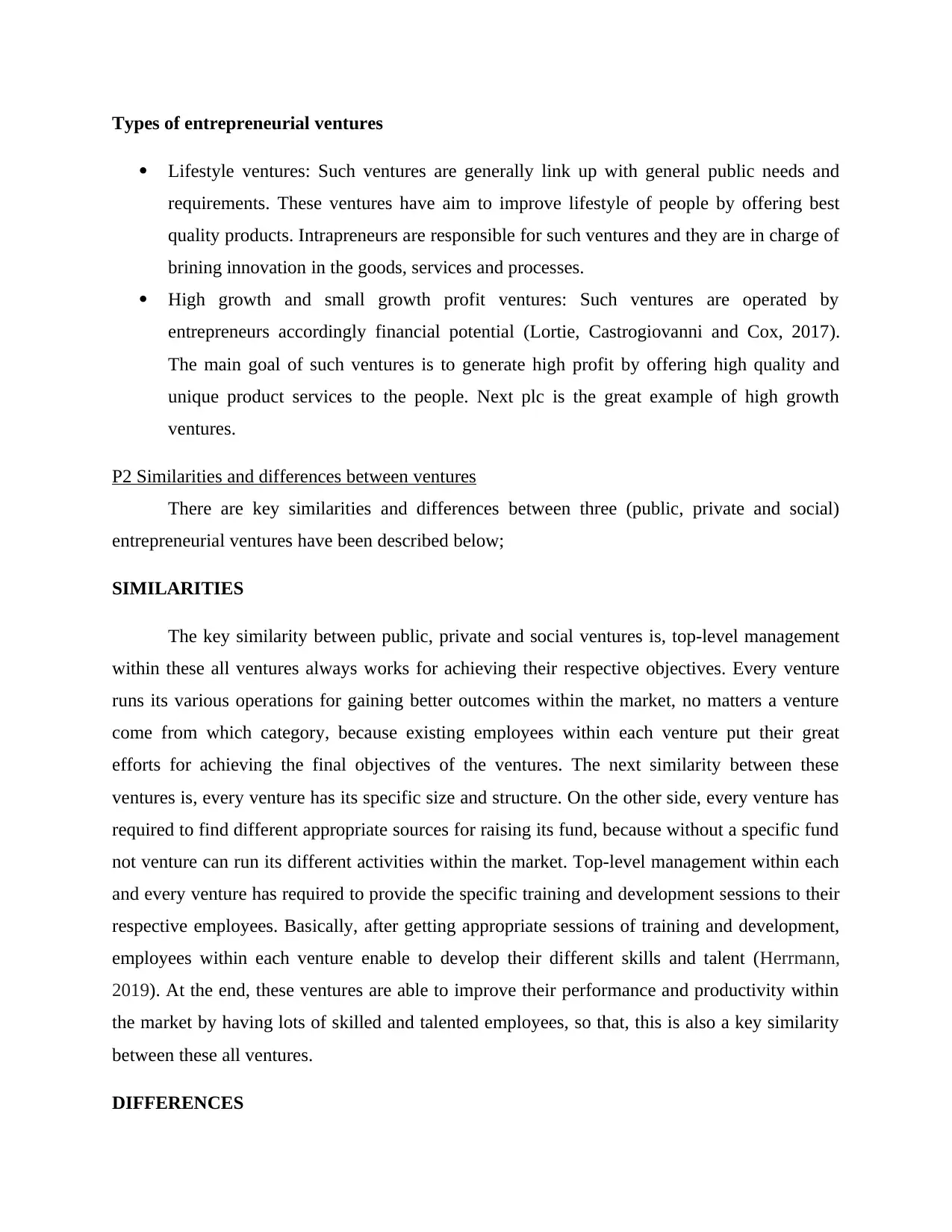
Types of entrepreneurial ventures
Lifestyle ventures: Such ventures are generally link up with general public needs and
requirements. These ventures have aim to improve lifestyle of people by offering best
quality products. Intrapreneurs are responsible for such ventures and they are in charge of
brining innovation in the goods, services and processes.
High growth and small growth profit ventures: Such ventures are operated by
entrepreneurs accordingly financial potential (Lortie, Castrogiovanni and Cox, 2017).
The main goal of such ventures is to generate high profit by offering high quality and
unique product services to the people. Next plc is the great example of high growth
ventures.
P2 Similarities and differences between ventures
There are key similarities and differences between three (public, private and social)
entrepreneurial ventures have been described below;
SIMILARITIES
The key similarity between public, private and social ventures is, top-level management
within these all ventures always works for achieving their respective objectives. Every venture
runs its various operations for gaining better outcomes within the market, no matters a venture
come from which category, because existing employees within each venture put their great
efforts for achieving the final objectives of the ventures. The next similarity between these
ventures is, every venture has its specific size and structure. On the other side, every venture has
required to find different appropriate sources for raising its fund, because without a specific fund
not venture can run its different activities within the market. Top-level management within each
and every venture has required to provide the specific training and development sessions to their
respective employees. Basically, after getting appropriate sessions of training and development,
employees within each venture enable to develop their different skills and talent (Herrmann,
2019). At the end, these ventures are able to improve their performance and productivity within
the market by having lots of skilled and talented employees, so that, this is also a key similarity
between these all ventures.
DIFFERENCES
Lifestyle ventures: Such ventures are generally link up with general public needs and
requirements. These ventures have aim to improve lifestyle of people by offering best
quality products. Intrapreneurs are responsible for such ventures and they are in charge of
brining innovation in the goods, services and processes.
High growth and small growth profit ventures: Such ventures are operated by
entrepreneurs accordingly financial potential (Lortie, Castrogiovanni and Cox, 2017).
The main goal of such ventures is to generate high profit by offering high quality and
unique product services to the people. Next plc is the great example of high growth
ventures.
P2 Similarities and differences between ventures
There are key similarities and differences between three (public, private and social)
entrepreneurial ventures have been described below;
SIMILARITIES
The key similarity between public, private and social ventures is, top-level management
within these all ventures always works for achieving their respective objectives. Every venture
runs its various operations for gaining better outcomes within the market, no matters a venture
come from which category, because existing employees within each venture put their great
efforts for achieving the final objectives of the ventures. The next similarity between these
ventures is, every venture has its specific size and structure. On the other side, every venture has
required to find different appropriate sources for raising its fund, because without a specific fund
not venture can run its different activities within the market. Top-level management within each
and every venture has required to provide the specific training and development sessions to their
respective employees. Basically, after getting appropriate sessions of training and development,
employees within each venture enable to develop their different skills and talent (Herrmann,
2019). At the end, these ventures are able to improve their performance and productivity within
the market by having lots of skilled and talented employees, so that, this is also a key similarity
between these all ventures.
DIFFERENCES
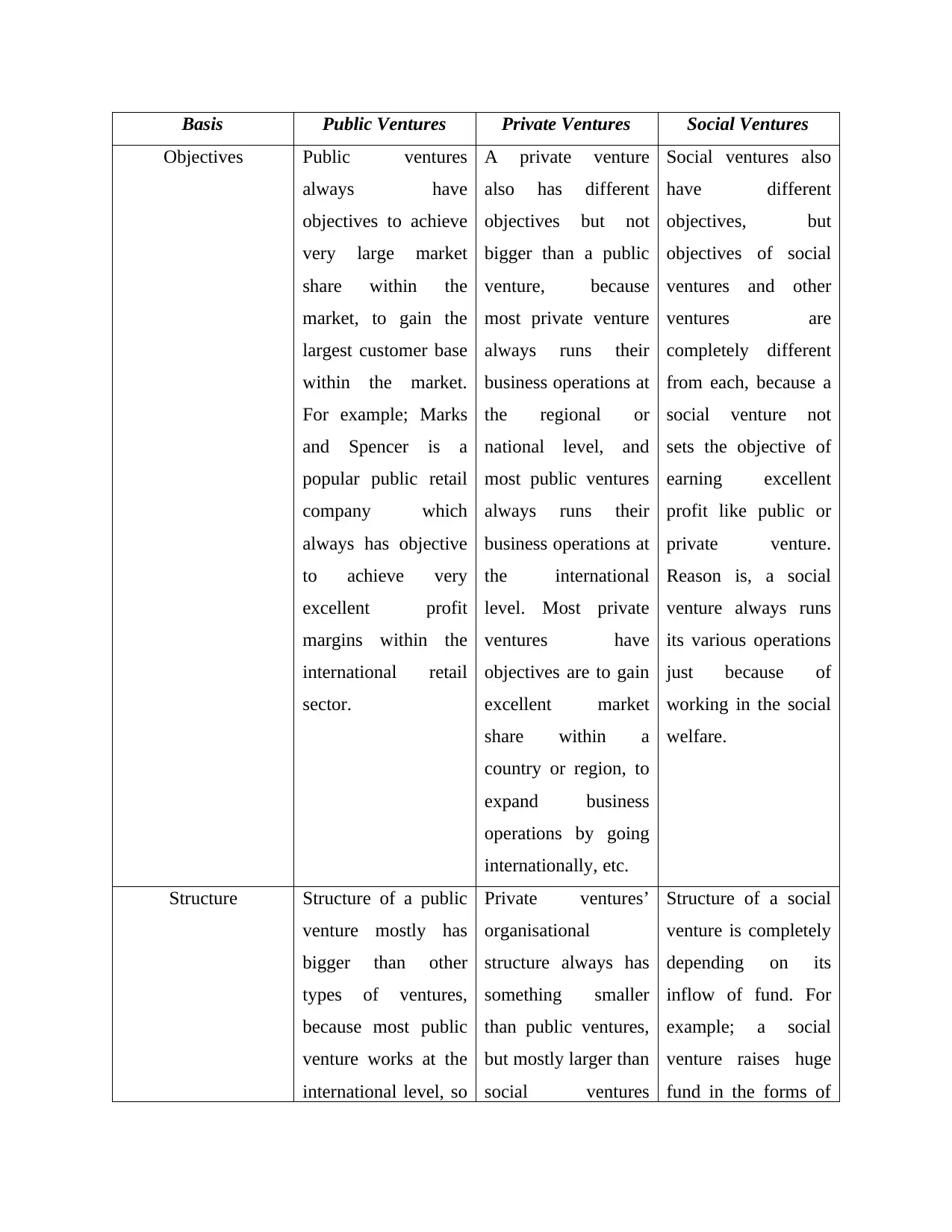
Basis Public Ventures Private Ventures Social Ventures
Objectives Public ventures
always have
objectives to achieve
very large market
share within the
market, to gain the
largest customer base
within the market.
For example; Marks
and Spencer is a
popular public retail
company which
always has objective
to achieve very
excellent profit
margins within the
international retail
sector.
A private venture
also has different
objectives but not
bigger than a public
venture, because
most private venture
always runs their
business operations at
the regional or
national level, and
most public ventures
always runs their
business operations at
the international
level. Most private
ventures have
objectives are to gain
excellent market
share within a
country or region, to
expand business
operations by going
internationally, etc.
Social ventures also
have different
objectives, but
objectives of social
ventures and other
ventures are
completely different
from each, because a
social venture not
sets the objective of
earning excellent
profit like public or
private venture.
Reason is, a social
venture always runs
its various operations
just because of
working in the social
welfare.
Structure Structure of a public
venture mostly has
bigger than other
types of ventures,
because most public
venture works at the
international level, so
Private ventures’
organisational
structure always has
something smaller
than public ventures,
but mostly larger than
social ventures
Structure of a social
venture is completely
depending on its
inflow of fund. For
example; a social
venture raises huge
fund in the forms of
Objectives Public ventures
always have
objectives to achieve
very large market
share within the
market, to gain the
largest customer base
within the market.
For example; Marks
and Spencer is a
popular public retail
company which
always has objective
to achieve very
excellent profit
margins within the
international retail
sector.
A private venture
also has different
objectives but not
bigger than a public
venture, because
most private venture
always runs their
business operations at
the regional or
national level, and
most public ventures
always runs their
business operations at
the international
level. Most private
ventures have
objectives are to gain
excellent market
share within a
country or region, to
expand business
operations by going
internationally, etc.
Social ventures also
have different
objectives, but
objectives of social
ventures and other
ventures are
completely different
from each, because a
social venture not
sets the objective of
earning excellent
profit like public or
private venture.
Reason is, a social
venture always runs
its various operations
just because of
working in the social
welfare.
Structure Structure of a public
venture mostly has
bigger than other
types of ventures,
because most public
venture works at the
international level, so
Private ventures’
organisational
structure always has
something smaller
than public ventures,
but mostly larger than
social ventures
Structure of a social
venture is completely
depending on its
inflow of fund. For
example; a social
venture raises huge
fund in the forms of
⊘ This is a preview!⊘
Do you want full access?
Subscribe today to unlock all pages.

Trusted by 1+ million students worldwide
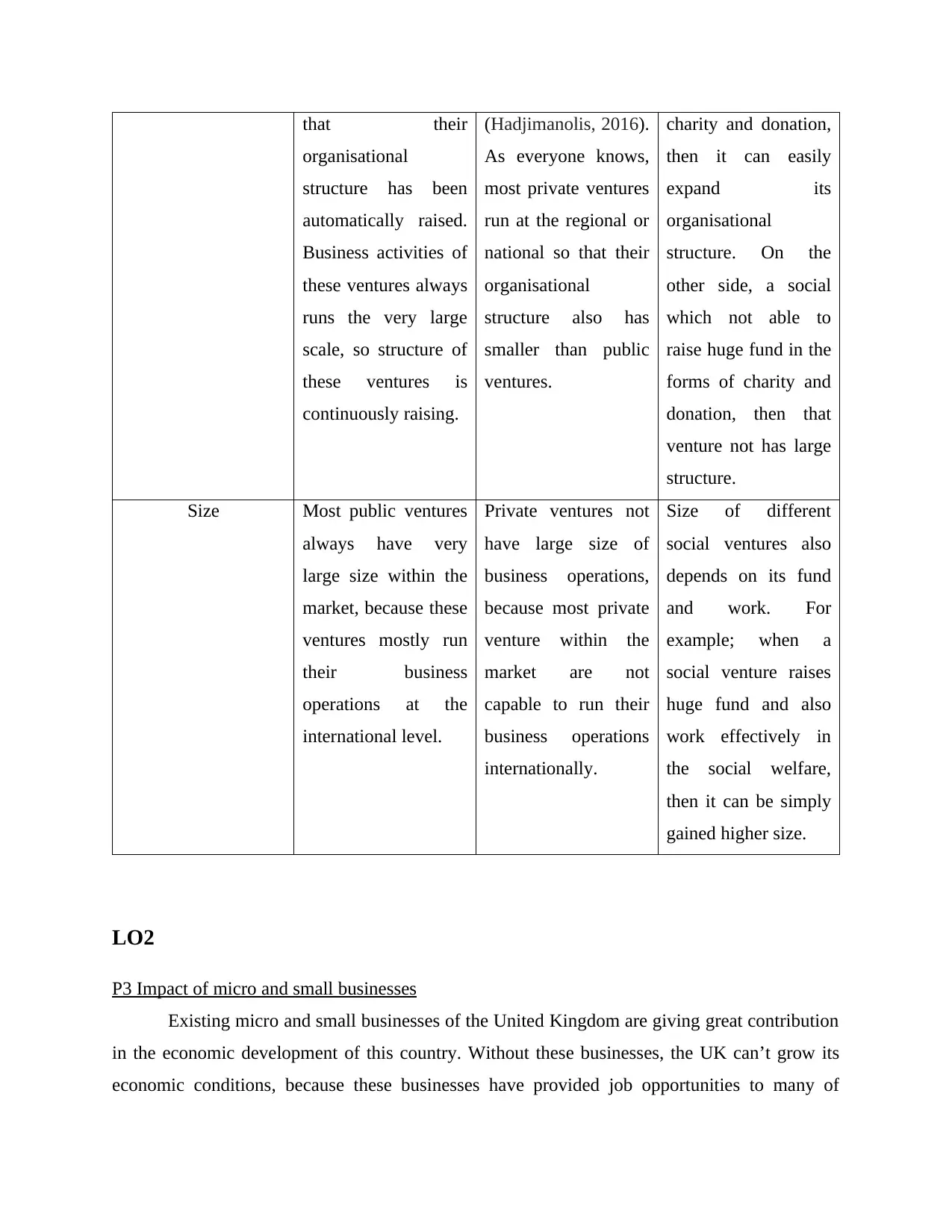
that their
organisational
structure has been
automatically raised.
Business activities of
these ventures always
runs the very large
scale, so structure of
these ventures is
continuously raising.
(Hadjimanolis, 2016).
As everyone knows,
most private ventures
run at the regional or
national so that their
organisational
structure also has
smaller than public
ventures.
charity and donation,
then it can easily
expand its
organisational
structure. On the
other side, a social
which not able to
raise huge fund in the
forms of charity and
donation, then that
venture not has large
structure.
Size Most public ventures
always have very
large size within the
market, because these
ventures mostly run
their business
operations at the
international level.
Private ventures not
have large size of
business operations,
because most private
venture within the
market are not
capable to run their
business operations
internationally.
Size of different
social ventures also
depends on its fund
and work. For
example; when a
social venture raises
huge fund and also
work effectively in
the social welfare,
then it can be simply
gained higher size.
LO2
P3 Impact of micro and small businesses
Existing micro and small businesses of the United Kingdom are giving great contribution
in the economic development of this country. Without these businesses, the UK can’t grow its
economic conditions, because these businesses have provided job opportunities to many of
organisational
structure has been
automatically raised.
Business activities of
these ventures always
runs the very large
scale, so structure of
these ventures is
continuously raising.
(Hadjimanolis, 2016).
As everyone knows,
most private ventures
run at the regional or
national so that their
organisational
structure also has
smaller than public
ventures.
charity and donation,
then it can easily
expand its
organisational
structure. On the
other side, a social
which not able to
raise huge fund in the
forms of charity and
donation, then that
venture not has large
structure.
Size Most public ventures
always have very
large size within the
market, because these
ventures mostly run
their business
operations at the
international level.
Private ventures not
have large size of
business operations,
because most private
venture within the
market are not
capable to run their
business operations
internationally.
Size of different
social ventures also
depends on its fund
and work. For
example; when a
social venture raises
huge fund and also
work effectively in
the social welfare,
then it can be simply
gained higher size.
LO2
P3 Impact of micro and small businesses
Existing micro and small businesses of the United Kingdom are giving great contribution
in the economic development of this country. Without these businesses, the UK can’t grow its
economic conditions, because these businesses have provided job opportunities to many of
Paraphrase This Document
Need a fresh take? Get an instant paraphrase of this document with our AI Paraphraser
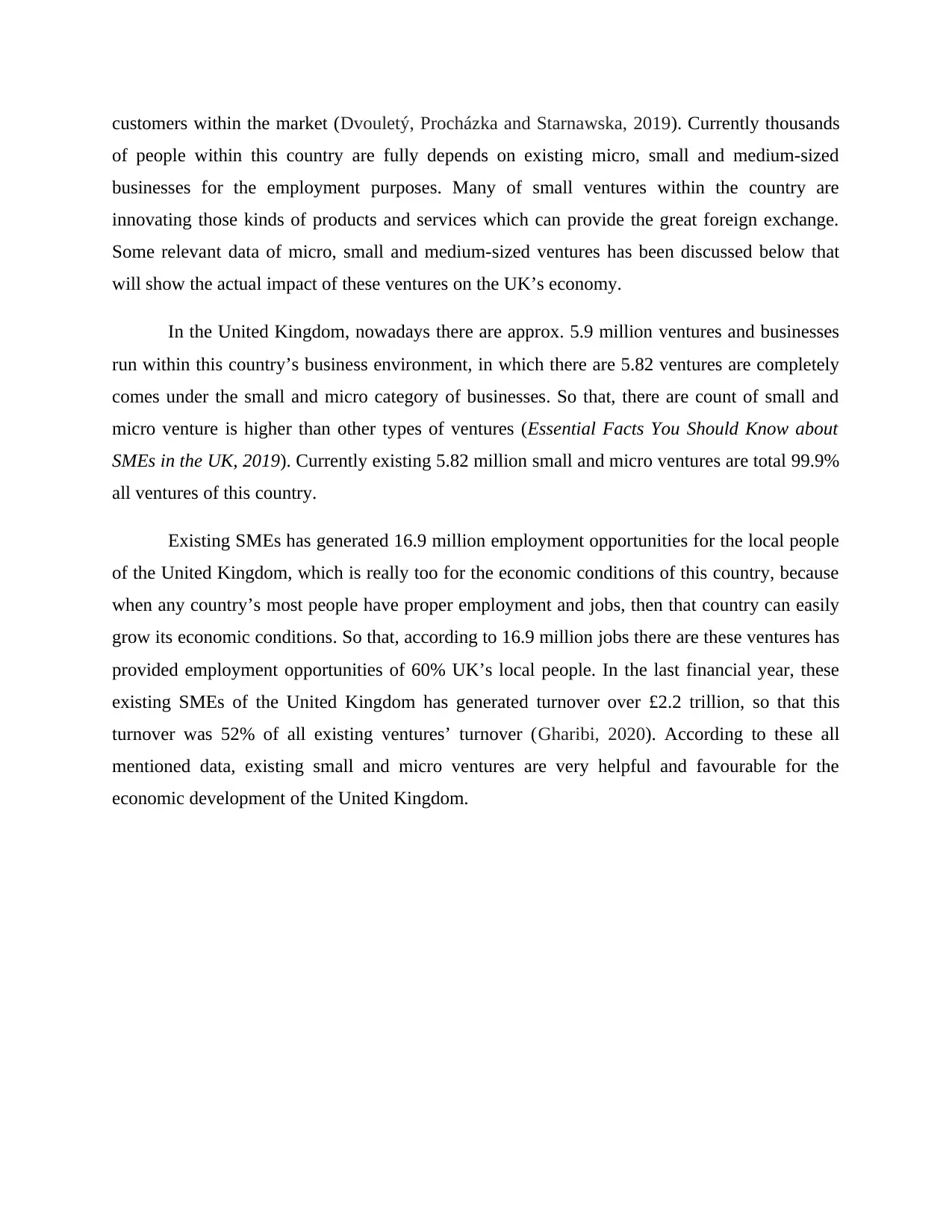
customers within the market (Dvouletý, Procházka and Starnawska, 2019). Currently thousands
of people within this country are fully depends on existing micro, small and medium-sized
businesses for the employment purposes. Many of small ventures within the country are
innovating those kinds of products and services which can provide the great foreign exchange.
Some relevant data of micro, small and medium-sized ventures has been discussed below that
will show the actual impact of these ventures on the UK’s economy.
In the United Kingdom, nowadays there are approx. 5.9 million ventures and businesses
run within this country’s business environment, in which there are 5.82 ventures are completely
comes under the small and micro category of businesses. So that, there are count of small and
micro venture is higher than other types of ventures (Essential Facts You Should Know about
SMEs in the UK, 2019). Currently existing 5.82 million small and micro ventures are total 99.9%
all ventures of this country.
Existing SMEs has generated 16.9 million employment opportunities for the local people
of the United Kingdom, which is really too for the economic conditions of this country, because
when any country’s most people have proper employment and jobs, then that country can easily
grow its economic conditions. So that, according to 16.9 million jobs there are these ventures has
provided employment opportunities of 60% UK’s local people. In the last financial year, these
existing SMEs of the United Kingdom has generated turnover over £2.2 trillion, so that this
turnover was 52% of all existing ventures’ turnover (Gharibi, 2020). According to these all
mentioned data, existing small and micro ventures are very helpful and favourable for the
economic development of the United Kingdom.
of people within this country are fully depends on existing micro, small and medium-sized
businesses for the employment purposes. Many of small ventures within the country are
innovating those kinds of products and services which can provide the great foreign exchange.
Some relevant data of micro, small and medium-sized ventures has been discussed below that
will show the actual impact of these ventures on the UK’s economy.
In the United Kingdom, nowadays there are approx. 5.9 million ventures and businesses
run within this country’s business environment, in which there are 5.82 ventures are completely
comes under the small and micro category of businesses. So that, there are count of small and
micro venture is higher than other types of ventures (Essential Facts You Should Know about
SMEs in the UK, 2019). Currently existing 5.82 million small and micro ventures are total 99.9%
all ventures of this country.
Existing SMEs has generated 16.9 million employment opportunities for the local people
of the United Kingdom, which is really too for the economic conditions of this country, because
when any country’s most people have proper employment and jobs, then that country can easily
grow its economic conditions. So that, according to 16.9 million jobs there are these ventures has
provided employment opportunities of 60% UK’s local people. In the last financial year, these
existing SMEs of the United Kingdom has generated turnover over £2.2 trillion, so that this
turnover was 52% of all existing ventures’ turnover (Gharibi, 2020). According to these all
mentioned data, existing small and micro ventures are very helpful and favourable for the
economic development of the United Kingdom.
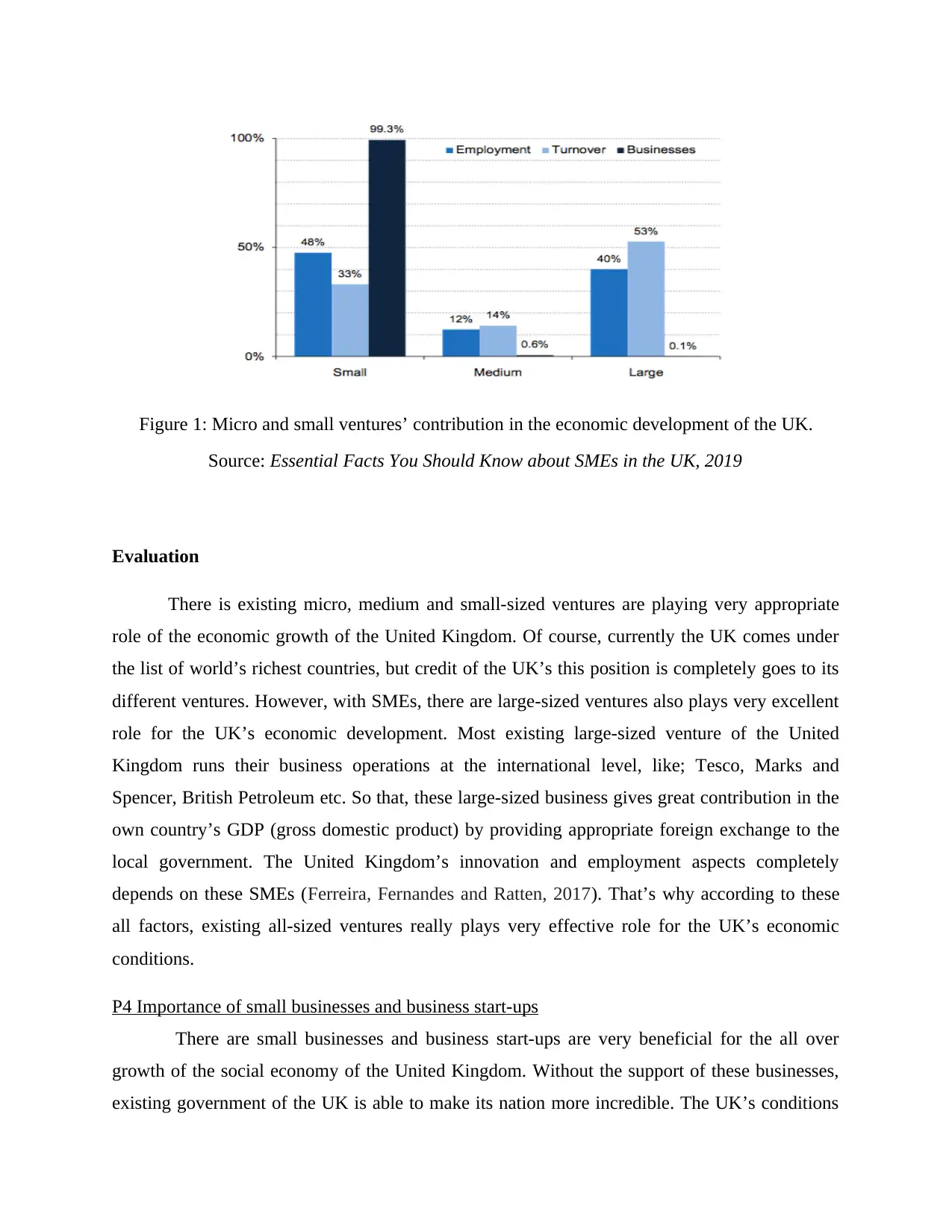
Figure 1: Micro and small ventures’ contribution in the economic development of the UK.
Source: Essential Facts You Should Know about SMEs in the UK, 2019
Evaluation
There is existing micro, medium and small-sized ventures are playing very appropriate
role of the economic growth of the United Kingdom. Of course, currently the UK comes under
the list of world’s richest countries, but credit of the UK’s this position is completely goes to its
different ventures. However, with SMEs, there are large-sized ventures also plays very excellent
role for the UK’s economic development. Most existing large-sized venture of the United
Kingdom runs their business operations at the international level, like; Tesco, Marks and
Spencer, British Petroleum etc. So that, these large-sized business gives great contribution in the
own country’s GDP (gross domestic product) by providing appropriate foreign exchange to the
local government. The United Kingdom’s innovation and employment aspects completely
depends on these SMEs (Ferreira, Fernandes and Ratten, 2017). That’s why according to these
all factors, existing all-sized ventures really plays very effective role for the UK’s economic
conditions.
P4 Importance of small businesses and business start-ups
There are small businesses and business start-ups are very beneficial for the all over
growth of the social economy of the United Kingdom. Without the support of these businesses,
existing government of the UK is able to make its nation more incredible. The UK’s conditions
Source: Essential Facts You Should Know about SMEs in the UK, 2019
Evaluation
There is existing micro, medium and small-sized ventures are playing very appropriate
role of the economic growth of the United Kingdom. Of course, currently the UK comes under
the list of world’s richest countries, but credit of the UK’s this position is completely goes to its
different ventures. However, with SMEs, there are large-sized ventures also plays very excellent
role for the UK’s economic development. Most existing large-sized venture of the United
Kingdom runs their business operations at the international level, like; Tesco, Marks and
Spencer, British Petroleum etc. So that, these large-sized business gives great contribution in the
own country’s GDP (gross domestic product) by providing appropriate foreign exchange to the
local government. The United Kingdom’s innovation and employment aspects completely
depends on these SMEs (Ferreira, Fernandes and Ratten, 2017). That’s why according to these
all factors, existing all-sized ventures really plays very effective role for the UK’s economic
conditions.
P4 Importance of small businesses and business start-ups
There are small businesses and business start-ups are very beneficial for the all over
growth of the social economy of the United Kingdom. Without the support of these businesses,
existing government of the UK is able to make its nation more incredible. The UK’s conditions
⊘ This is a preview!⊘
Do you want full access?
Subscribe today to unlock all pages.

Trusted by 1+ million students worldwide
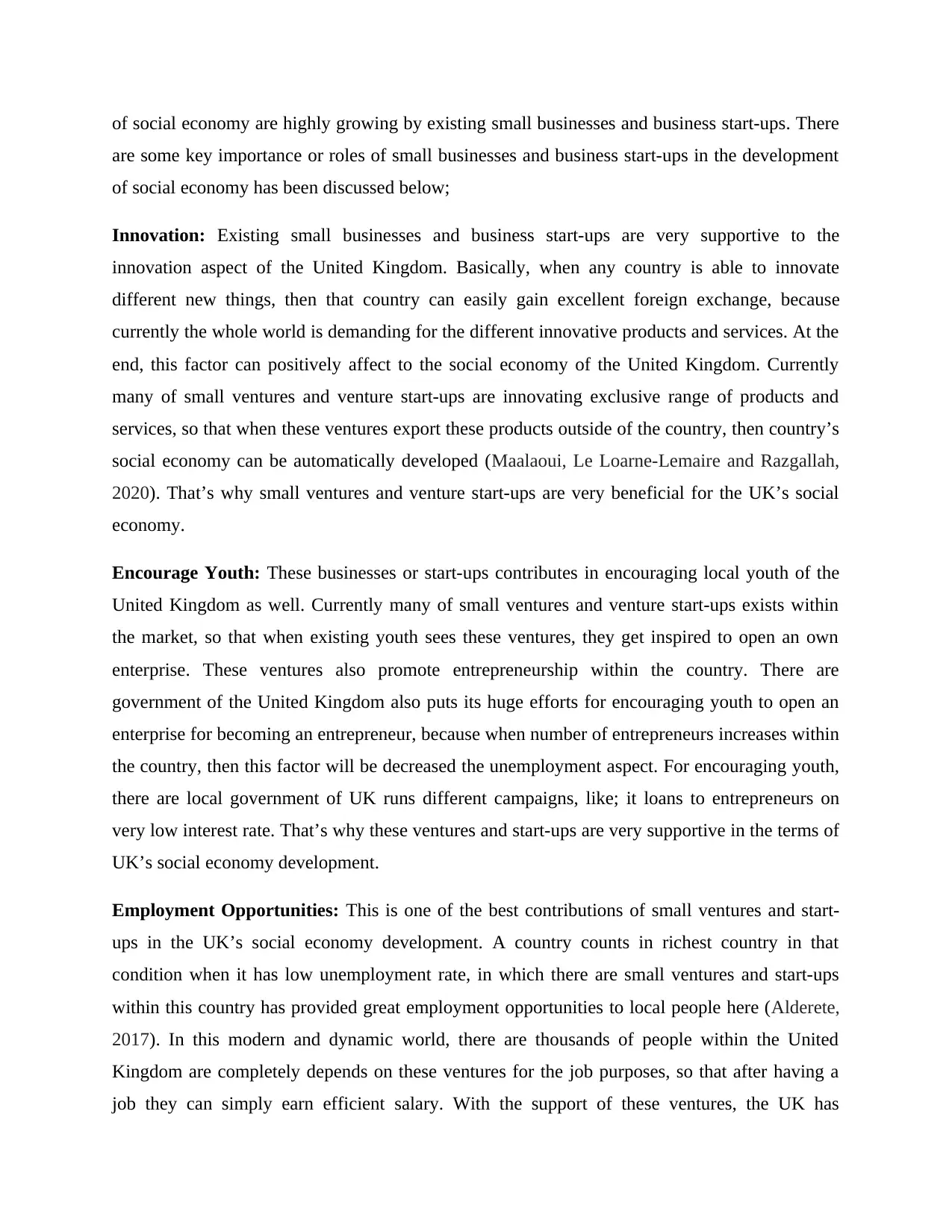
of social economy are highly growing by existing small businesses and business start-ups. There
are some key importance or roles of small businesses and business start-ups in the development
of social economy has been discussed below;
Innovation: Existing small businesses and business start-ups are very supportive to the
innovation aspect of the United Kingdom. Basically, when any country is able to innovate
different new things, then that country can easily gain excellent foreign exchange, because
currently the whole world is demanding for the different innovative products and services. At the
end, this factor can positively affect to the social economy of the United Kingdom. Currently
many of small ventures and venture start-ups are innovating exclusive range of products and
services, so that when these ventures export these products outside of the country, then country’s
social economy can be automatically developed (Maalaoui, Le Loarne-Lemaire and Razgallah,
2020). That’s why small ventures and venture start-ups are very beneficial for the UK’s social
economy.
Encourage Youth: These businesses or start-ups contributes in encouraging local youth of the
United Kingdom as well. Currently many of small ventures and venture start-ups exists within
the market, so that when existing youth sees these ventures, they get inspired to open an own
enterprise. These ventures also promote entrepreneurship within the country. There are
government of the United Kingdom also puts its huge efforts for encouraging youth to open an
enterprise for becoming an entrepreneur, because when number of entrepreneurs increases within
the country, then this factor will be decreased the unemployment aspect. For encouraging youth,
there are local government of UK runs different campaigns, like; it loans to entrepreneurs on
very low interest rate. That’s why these ventures and start-ups are very supportive in the terms of
UK’s social economy development.
Employment Opportunities: This is one of the best contributions of small ventures and start-
ups in the UK’s social economy development. A country counts in richest country in that
condition when it has low unemployment rate, in which there are small ventures and start-ups
within this country has provided great employment opportunities to local people here (Alderete,
2017). In this modern and dynamic world, there are thousands of people within the United
Kingdom are completely depends on these ventures for the job purposes, so that after having a
job they can simply earn efficient salary. With the support of these ventures, the UK has
are some key importance or roles of small businesses and business start-ups in the development
of social economy has been discussed below;
Innovation: Existing small businesses and business start-ups are very supportive to the
innovation aspect of the United Kingdom. Basically, when any country is able to innovate
different new things, then that country can easily gain excellent foreign exchange, because
currently the whole world is demanding for the different innovative products and services. At the
end, this factor can positively affect to the social economy of the United Kingdom. Currently
many of small ventures and venture start-ups are innovating exclusive range of products and
services, so that when these ventures export these products outside of the country, then country’s
social economy can be automatically developed (Maalaoui, Le Loarne-Lemaire and Razgallah,
2020). That’s why small ventures and venture start-ups are very beneficial for the UK’s social
economy.
Encourage Youth: These businesses or start-ups contributes in encouraging local youth of the
United Kingdom as well. Currently many of small ventures and venture start-ups exists within
the market, so that when existing youth sees these ventures, they get inspired to open an own
enterprise. These ventures also promote entrepreneurship within the country. There are
government of the United Kingdom also puts its huge efforts for encouraging youth to open an
enterprise for becoming an entrepreneur, because when number of entrepreneurs increases within
the country, then this factor will be decreased the unemployment aspect. For encouraging youth,
there are local government of UK runs different campaigns, like; it loans to entrepreneurs on
very low interest rate. That’s why these ventures and start-ups are very supportive in the terms of
UK’s social economy development.
Employment Opportunities: This is one of the best contributions of small ventures and start-
ups in the UK’s social economy development. A country counts in richest country in that
condition when it has low unemployment rate, in which there are small ventures and start-ups
within this country has provided great employment opportunities to local people here (Alderete,
2017). In this modern and dynamic world, there are thousands of people within the United
Kingdom are completely depends on these ventures for the job purposes, so that after having a
job they can simply earn efficient salary. With the support of these ventures, the UK has
Paraphrase This Document
Need a fresh take? Get an instant paraphrase of this document with our AI Paraphraser
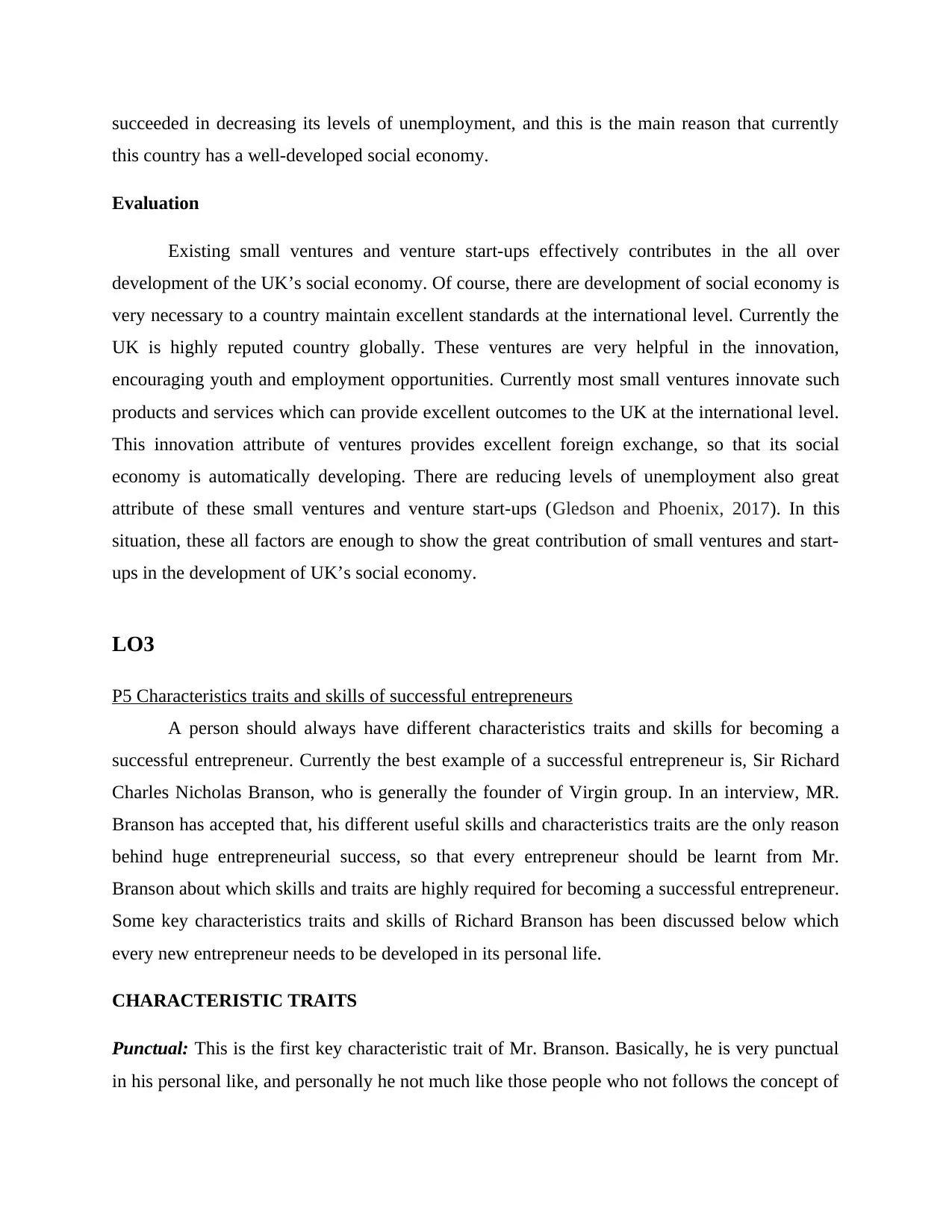
succeeded in decreasing its levels of unemployment, and this is the main reason that currently
this country has a well-developed social economy.
Evaluation
Existing small ventures and venture start-ups effectively contributes in the all over
development of the UK’s social economy. Of course, there are development of social economy is
very necessary to a country maintain excellent standards at the international level. Currently the
UK is highly reputed country globally. These ventures are very helpful in the innovation,
encouraging youth and employment opportunities. Currently most small ventures innovate such
products and services which can provide excellent outcomes to the UK at the international level.
This innovation attribute of ventures provides excellent foreign exchange, so that its social
economy is automatically developing. There are reducing levels of unemployment also great
attribute of these small ventures and venture start-ups (Gledson and Phoenix, 2017). In this
situation, these all factors are enough to show the great contribution of small ventures and start-
ups in the development of UK’s social economy.
LO3
P5 Characteristics traits and skills of successful entrepreneurs
A person should always have different characteristics traits and skills for becoming a
successful entrepreneur. Currently the best example of a successful entrepreneur is, Sir Richard
Charles Nicholas Branson, who is generally the founder of Virgin group. In an interview, MR.
Branson has accepted that, his different useful skills and characteristics traits are the only reason
behind huge entrepreneurial success, so that every entrepreneur should be learnt from Mr.
Branson about which skills and traits are highly required for becoming a successful entrepreneur.
Some key characteristics traits and skills of Richard Branson has been discussed below which
every new entrepreneur needs to be developed in its personal life.
CHARACTERISTIC TRAITS
Punctual: This is the first key characteristic trait of Mr. Branson. Basically, he is very punctual
in his personal like, and personally he not much like those people who not follows the concept of
this country has a well-developed social economy.
Evaluation
Existing small ventures and venture start-ups effectively contributes in the all over
development of the UK’s social economy. Of course, there are development of social economy is
very necessary to a country maintain excellent standards at the international level. Currently the
UK is highly reputed country globally. These ventures are very helpful in the innovation,
encouraging youth and employment opportunities. Currently most small ventures innovate such
products and services which can provide excellent outcomes to the UK at the international level.
This innovation attribute of ventures provides excellent foreign exchange, so that its social
economy is automatically developing. There are reducing levels of unemployment also great
attribute of these small ventures and venture start-ups (Gledson and Phoenix, 2017). In this
situation, these all factors are enough to show the great contribution of small ventures and start-
ups in the development of UK’s social economy.
LO3
P5 Characteristics traits and skills of successful entrepreneurs
A person should always have different characteristics traits and skills for becoming a
successful entrepreneur. Currently the best example of a successful entrepreneur is, Sir Richard
Charles Nicholas Branson, who is generally the founder of Virgin group. In an interview, MR.
Branson has accepted that, his different useful skills and characteristics traits are the only reason
behind huge entrepreneurial success, so that every entrepreneur should be learnt from Mr.
Branson about which skills and traits are highly required for becoming a successful entrepreneur.
Some key characteristics traits and skills of Richard Branson has been discussed below which
every new entrepreneur needs to be developed in its personal life.
CHARACTERISTIC TRAITS
Punctual: This is the first key characteristic trait of Mr. Branson. Basically, he is very punctual
in his personal like, and personally he not much like those people who not follows the concept of
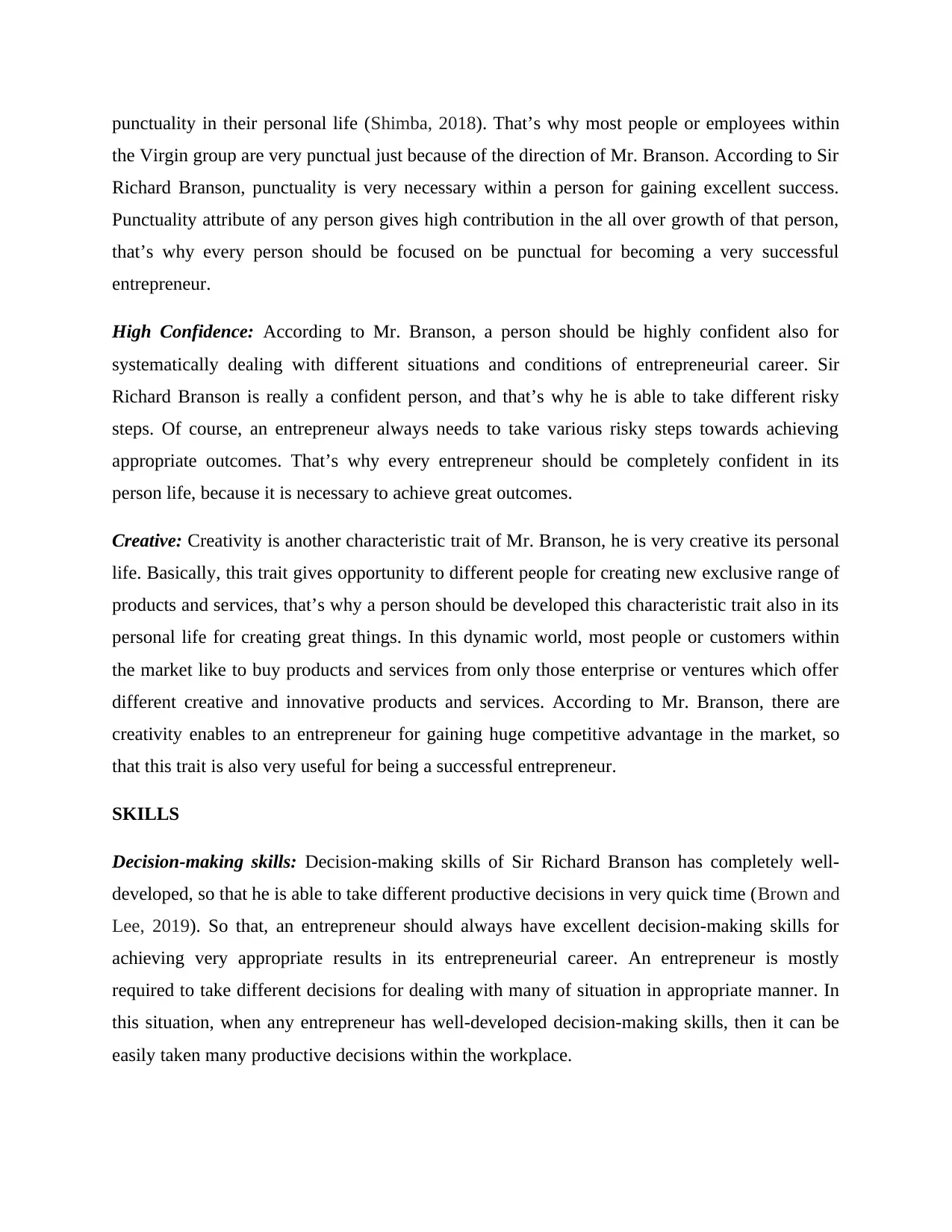
punctuality in their personal life (Shimba, 2018). That’s why most people or employees within
the Virgin group are very punctual just because of the direction of Mr. Branson. According to Sir
Richard Branson, punctuality is very necessary within a person for gaining excellent success.
Punctuality attribute of any person gives high contribution in the all over growth of that person,
that’s why every person should be focused on be punctual for becoming a very successful
entrepreneur.
High Confidence: According to Mr. Branson, a person should be highly confident also for
systematically dealing with different situations and conditions of entrepreneurial career. Sir
Richard Branson is really a confident person, and that’s why he is able to take different risky
steps. Of course, an entrepreneur always needs to take various risky steps towards achieving
appropriate outcomes. That’s why every entrepreneur should be completely confident in its
person life, because it is necessary to achieve great outcomes.
Creative: Creativity is another characteristic trait of Mr. Branson, he is very creative its personal
life. Basically, this trait gives opportunity to different people for creating new exclusive range of
products and services, that’s why a person should be developed this characteristic trait also in its
personal life for creating great things. In this dynamic world, most people or customers within
the market like to buy products and services from only those enterprise or ventures which offer
different creative and innovative products and services. According to Mr. Branson, there are
creativity enables to an entrepreneur for gaining huge competitive advantage in the market, so
that this trait is also very useful for being a successful entrepreneur.
SKILLS
Decision-making skills: Decision-making skills of Sir Richard Branson has completely well-
developed, so that he is able to take different productive decisions in very quick time (Brown and
Lee, 2019). So that, an entrepreneur should always have excellent decision-making skills for
achieving very appropriate results in its entrepreneurial career. An entrepreneur is mostly
required to take different decisions for dealing with many of situation in appropriate manner. In
this situation, when any entrepreneur has well-developed decision-making skills, then it can be
easily taken many productive decisions within the workplace.
the Virgin group are very punctual just because of the direction of Mr. Branson. According to Sir
Richard Branson, punctuality is very necessary within a person for gaining excellent success.
Punctuality attribute of any person gives high contribution in the all over growth of that person,
that’s why every person should be focused on be punctual for becoming a very successful
entrepreneur.
High Confidence: According to Mr. Branson, a person should be highly confident also for
systematically dealing with different situations and conditions of entrepreneurial career. Sir
Richard Branson is really a confident person, and that’s why he is able to take different risky
steps. Of course, an entrepreneur always needs to take various risky steps towards achieving
appropriate outcomes. That’s why every entrepreneur should be completely confident in its
person life, because it is necessary to achieve great outcomes.
Creative: Creativity is another characteristic trait of Mr. Branson, he is very creative its personal
life. Basically, this trait gives opportunity to different people for creating new exclusive range of
products and services, that’s why a person should be developed this characteristic trait also in its
personal life for creating great things. In this dynamic world, most people or customers within
the market like to buy products and services from only those enterprise or ventures which offer
different creative and innovative products and services. According to Mr. Branson, there are
creativity enables to an entrepreneur for gaining huge competitive advantage in the market, so
that this trait is also very useful for being a successful entrepreneur.
SKILLS
Decision-making skills: Decision-making skills of Sir Richard Branson has completely well-
developed, so that he is able to take different productive decisions in very quick time (Brown and
Lee, 2019). So that, an entrepreneur should always have excellent decision-making skills for
achieving very appropriate results in its entrepreneurial career. An entrepreneur is mostly
required to take different decisions for dealing with many of situation in appropriate manner. In
this situation, when any entrepreneur has well-developed decision-making skills, then it can be
easily taken many productive decisions within the workplace.
⊘ This is a preview!⊘
Do you want full access?
Subscribe today to unlock all pages.

Trusted by 1+ million students worldwide
1 out of 17
Related Documents
Your All-in-One AI-Powered Toolkit for Academic Success.
+13062052269
info@desklib.com
Available 24*7 on WhatsApp / Email
![[object Object]](/_next/static/media/star-bottom.7253800d.svg)
Unlock your academic potential
Copyright © 2020–2026 A2Z Services. All Rights Reserved. Developed and managed by ZUCOL.




